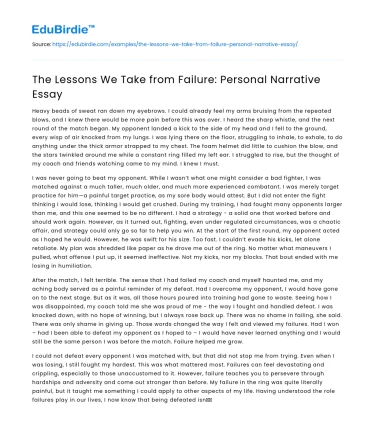Heavy beads of sweat ran down my eyebrows. I could already feel my arms bruising from the repeated blows, and I knew there would be more pain before this was over. I heard the sharp whistle, and the next round of the match began. My opponent landed a kick to the side of my head and I fell to the ground, every wisp of air knocked from my lungs. I was lying there on the floor, struggling to inhale, to exhale, to do anything under the thick armor strapped to my chest. The foam helmet did little to cushion the blow, and the stars twinkled around me while a constant ring filled my left ear. I struggled to rise, but the thought of my coach and friends watching came to my mind. I knew I must.
I was never going to beat my opponent. While I wasn’t what one might consider a bad fighter, I was matched against a much taller, much older, and much more experienced combatant. I was merely target practice for him—a painful target practice, as my sore body would attest. But I did not enter the fight thinking I would lose, thinking I would get crushed. During my training, I had fought many opponents larger than me, and this one seemed to be no different. I had a strategy - a solid one that worked before and should work again. However, as it turned out, fighting, even under regulated circumstances, was a chaotic affair, and strategy could only go so far to help you win. At the start of the first round, my opponent acted as I hoped he would. However, he was swift for his size. Too fast. I couldn’t evade his kicks, let alone retaliate. My plan was shredded like paper as he drove me out of the ring. No matter what maneuvers I pulled, what offense I put up, it seemed ineffective. Not my kicks, nor my blocks. That bout ended with me losing in humiliation.
Save your time!
We can take care of your essay
- Proper editing and formatting
- Free revision, title page, and bibliography
- Flexible prices and money-back guarantee
After the match, I felt terrible. The sense that I had failed my coach and myself haunted me, and my aching body served as a painful reminder of my defeat. Had I overcome my opponent, I would have gone on to the next stage. But as it was, all those hours poured into training had gone to waste. Seeing how I was disappointed, my coach told me she was proud of me - the way I fought and handled defeat. I was knocked down, with no hope of winning, but I always rose back up. There was no shame in failing, she said. There was only shame in giving up. Those words changed the way I felt and viewed my failures. Had I won – had I been able to defeat my opponent as I hoped to – I would have never learned anything and I would still be the same person I was before the match. Failure helped me grow.
I could not defeat every opponent I was matched with, but that did not stop me from trying. Even when I was losing, I still fought my hardest. This was what mattered most. Failures can feel devastating and crippling, especially to those unaccustomed to it. However, failure teaches you to persevere through hardships and adversity and come out stronger than before. My failure in the ring was quite literally painful, but it taught me something I could apply to other aspects of my life. Having understood the role failures play in our lives, I now know that being defeated isn’t what matters. Rising back up is.






 Stuck on your essay?
Stuck on your essay?

